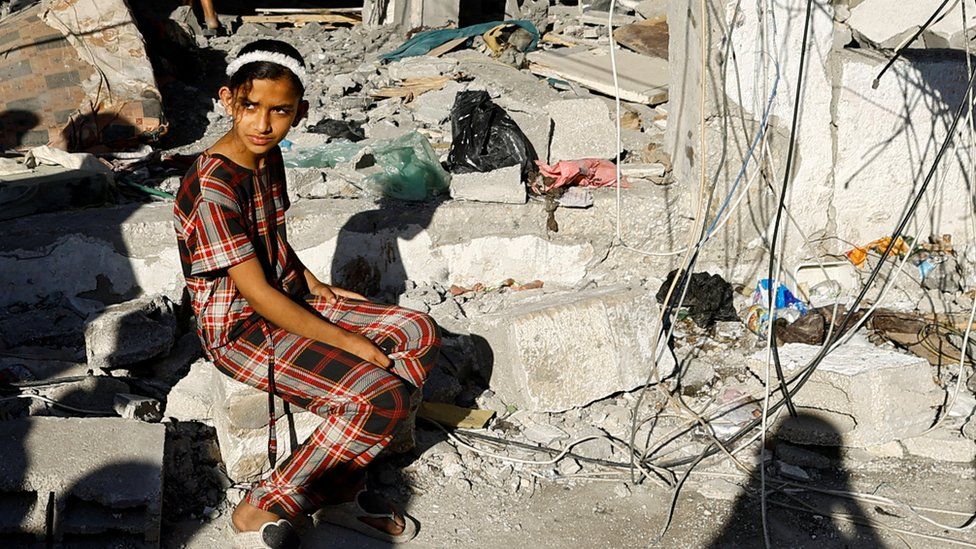Israel Gaza: US again warns against Rafah offensive
- Published

US officials have again raised concerns with their Israeli counterparts about Israel's plans for military operations in the southern Gaza city of Rafah.
The White House said representatives of Israel's prime minister had agreed "to take these concerns into account".
The US has repeatedly urged Israel not to launch a major offensive in Rafah to avoid more civilian casualties in Gaza.
Separately, the US vetoed a UN resolution to grant full member status to a State of Palestine.
In another development, US Defence Secretary Lloyd Austin spoke to Israeli Defence Minister Yoav Gallant to "discuss regional threats and Iran's destabilising actions in the Middle East".
They also discussed "the importance of increasing and sustaining the flow of humanitarian aid to Gazan civilians, including via the new route from Ashdod Port in Israel".
The Israeli military says it has struck dozens of targets in Gaza, a day after widespread Israeli bombing of the central part of the strip as well as Gaza City in the north.
Qatar - which has played a major mediating role in truce talks - said earlier that ceasefire negotiations had stalled.
Israeli Prime Minister Benjamin Netanyahu has consistently vowed to carry out an offensive in Rafah - where more than a million Palestinians are sheltering - as a next step in military actions against Hamas.
The US, Israel's closest ally, has been pressing Israel not to conduct a broad offensive in Rafah but to instead take a more targeted approach.
The war in Gaza erupted when Hamas-led gunmen carried out an unprecedented attack on southern Israel on 7 October, killing about 1,200 people, mainly civilians, and taking 253 others back to Gaza as hostages.
At least 33,970 people have been killed in Gaza since then, the majority of them women and children, according to the territory's Hamas-run health ministry, during Israel's military campaign to destroy Hamas and release hostages.
A White House readout of Thursday's meeting said Rafah was the focus of discussions along with Iran's unprecedented drone and missile strike on Israel last week.
"The two sides agreed on the shared objective to see Hamas defeated in Rafah. US participants expressed concerns with various courses of action in Rafah," the statement said.
It said they had agreed to have follow-up discussions between experts and would meet again soon.
According to US news site Axios, US officials have "flatly denied" reports that the Biden administration gave a "green light for an operation in Rafah" if Israel declined to strike Iran in retaliation for last weekend's attack on its territory.
Israel did not immediately comment on Thursday's meeting, which followed similar talks on 1 April.
At the time, US officials reportedly told the Israelis their planning for Rafah was insufficient for evacuating and protecting Palestinian civilians sheltering there after being forced to flee their homes.
The resolution to grant full UN member status to a State of Palestine was vetoed by the US at a meeting of the Security Council.
The Palestinian Authority has had observer status since 2012 but cannot vote in proceedings.
Twelve members voted in favour of the resolution - including France, Japan and South Korea - while the US was the lone member voting against, with two abstentions, by the UK and Switzerland.
It was a unilateral action the US had been keen to avoid if it possibly could, with reports of intense behind-the-scenes lobbying in advance of the vote in the hope of winning over some other Security Council members to its side.
Explaining his country's veto, the US deputy ambassador, Robert Wood, insisted Washington continued to strongly support a two-state solution, but that any change in status for a State of Palestine at the UN should only come as part of a negotiated settlement with Israel.
The Palestinian envoy to the UN, Riyad Mansour, said his people had a "natural right" to self-determination.
"The people of Palestine will not disappear," he added. "We will not disappear. The people of Palestine will not be buried. They are a historical fact. They are a history that cannot be erased no matter the great power, no matter the tyranny."
Israel's envoy to the UN, Gilad Erdan, thanked the US for "standing up for truth and morality in the face of hypocrisy and politics" and accused other countries who had backed the resolution of deciding to "reward Palestinian terror with Palestinian state".
According to Russia's envoy, Vassily Nebenzya, the US had "demonstrated their true attitude towards the Palestinians". To Washington, they don't deserve to have their own state," he added. "They are only an obstacle to the realization of Israel's interests."
The UK's envoy, Barbara Woodward, said: "We believe that such recognition of Palestinian statehood should not come at the start of a new process, but it doesn't have to be at the very end of the process. We must start with fixing the immediate crisis in Gaza."
- Published9 April